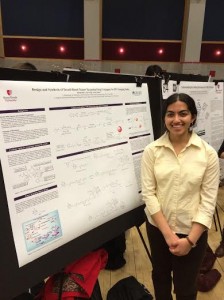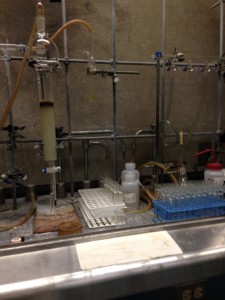Experiences that Have Shaped My Career Interests
We see it so often in the movies, it’s a scene that induces anxiety in those who view it even casually: professionals bustling in the office in response to an emergency issue. I envision myself responding to urgent situations in the near future as a professional in the pharmaceutical industry.
I grew up maintaining an interest in, and wanting to explore, the biological sciences. During every opportunity I had to observe doctors and nurses in action, I realized that there was so much that I wanted to learn myself. Since grade school, I had every intention to enter medical school and specialize in cardiology. I went to the hospital often during my defining childhood and teenage years, whether it was to visit my grandmother after her surgeries and emergencies or to volunteer in the patient care units. The terminology fascinated me, as did the complexity of the machines and medications.
As I matured, I became intrigued by health issues in the government and corporate world as they directly affect the medical field. In the case where a product is found to be defective, how do you handle the case? Who do you work with, and what are the steps taken to resolve the problem? How do you calmly, but effectively, approach the task so that the company and its employees do not lose their credibility? Many factors are involved. The defective products must be recalled, the issue must be identified, the appropriate departments must be contacted, and so on. To prepare myself for my career, I have pursued a degree in biochemistry and writing. Not only will I have the scientific background to understand the research and development of medical drugs and technology, but I will also have the ability to analyze data and share it with other professionals. The experiences that I have had and the skills that I have strengthened in the process will be of great importance.
Effective Communication
One of the unexpected discoveries that I made about the medical profession while I was in high school and college was that it not only involves specialized professional knowledge and skills, but it also requires oral and written communication. So, when I was a freshman in high school, I took the opportunity to participate in a scholastic competition, the Deborah Heart Challenge in South Jersey. It was my first time to actually read and try to learn from a college physiology textbook. I could learn the content fairly well, but I struggled to express what I was learning. I felt the need to develop my writing skills as a means for making sense, organizing, and effectively communicating the knowledge I was gaining.
I realized that learn best when I am presented with the information that I need to know in a straightforward manner. I need to have a goal in mind and in college, I aimed to reach the goal of developing my communication skills. It has helped me understand the purpose of my work and enjoy the sense of accomplishment. During my undergraduate years so far, I have come to realize that I do not enjoy guesswork. I prefer to be certain, and when I am uncertain, I apply the resources at hand to determine a solution. A fact that I remind myself on a daily basis is that effective communication is essential to success. If I retain the information that I learn, then I will be able to make wise decisions based on the theoretical application of that information.
Medicine to the Pharmaceutical Industry
I noticed the importance of communication as a student in the advising seminar for pre-medical students. During several sessions, we discussed the types of emergency cases that doctors have had to manage. Doctors have to know how to communicate effectively with their patients to make sure that everyone is fully aware of the situation. Without proper communication regarding a disease, treatment options, or prescriptions, a patient’s life can be put at risk (Gregory et al., 2011).
The lack of communication also poses an ethical dilemma in certain situations. While medical students do not place great emphasis on ethics during their training, it is a factor that always remains present. For example, a doctor may not acknowledge that he makes a mistake. Students will not necessarily be prepared for their future in medicine if they cannot communicate where their fault lies (Terndrup, 2013). Avoiding the acknowledgement of one’s mistakes is a problem, especially where another’s life is concerned. Noting the mistake and acting to resolve the issue would be the best option.
I spent years imagining myself as an “ideal doctor.” My understanding of an ideal doctor changed after the seminar discussions. I tried to put myself in the position of a doctor who failed to save a life. In fact, I did once see a patient die of cardiac arrest when I was volunteering in the ICU. I thought I was strong because I did not react to it while I was working, but I was really in shock. If I was ever in that place, I would not know how to handle my failure and would be guilt-ridden. It seemed to be too much pressure. On that day, however, I also saw that the nurses had to comfort the patient’s husband. They had to confront their failure to communicate with him about what went wrong and why they weren’t able to save his wife.
After much thought and an intense internal debate, I decided to leave the pre-medical track. For some time, I did not know what I would do instead. I knew I would go to graduate school instead to strengthen my background in biochemistry. As I mentioned before, I like to have a focus to guide me through my pursuits. This transition period was difficult for me because I had lost that focus and was trying to decide how I could apply the great knowledge I was accumulating.
Eventually, I decided to work towards a career in the pharmaceutical industry. My background in biochemistry would help me to understand the research and development aspects. I would also have the ability to influence healthcare, albeit in a more behind-the-scenes fashion. What attracts me to the pharmaceutical industry more than medicine is that communication is considered a must. There are always conferences, inspections, and reports. In the regulations department, for instance, communicating information is a necessity because it aids in problem-solving. Everyone is usually aware of what is happening and is engaged in some way (Black, 2002).
I didn’t realize it until recently, but many of my attributes make me better-suited for a career in the pharmaceutical industry. I want to enter a department that specifically focuses on product quality and the associated regulations. I enjoy analyzing issues and working to resolve them. My presentations regarding my studies are generally clear and effective to my classmates or team members. When I finally found my focus, I began to look for ways to gain practical experience that would help me in graduate school and my career.
The Benefit of Research
I was never interested in pursuing research as a career. I had never even considered it because I was so determined to follow the pre-medical track. When I modified my career path, I looked into the projects of several laboratories on campus. I was accepted in a chemistry lab to perform independent research for my senior thesis. I began to work on the synthesis of tumor-targeting drug conjugates in the laboratory. It was challenging. There were several setbacks from which I learned how to enhance the purity of my compounds. While I didn’t see success on a daily basis, I did see how much I grew over two semesters. I became more experienced and gained a better understanding of the chemical background. Once I complete the synthesis of the drug conjugates, I intend to test their efficacy on cancer cells and study the biochemical effect of my product.
Lab work is stressful. It is time-consuming and experiments do not necessarily happen as planned. There is a lot to be learned from this stress, though. When students work in a research lab outside of the lab courses required for their major, they gain greater practical exposure to the research team and the processes and technology involved in the laboratory. They also have the chance to learn to study primary literature, discuss it, and attempt to understand the practical application of the theories they have studied (Miller et al., 2013).
After reviewing primary literature for my thesis reports, I developed a greater interest in tumor-targeting methods. I was accepted to write for the university undergraduate student journal for a research review on a topic of my choice. I went beyond the literature I had studied for my thesis and explored peptide tumor-targeting molecules more specifically.
Writing for a journal was a different experience. Scientific articles should ideally be written to the point. The writing is supposed to be logically structured to be effective (Schulte, 2003). I had to determine a way to present the subject in a manner that college students would understand and find interesting. In the process, I worked to strengthen my communication abilities and was able to gain a great understanding of the material myself. It was satisfying to see that I was capable of condensing information for a focus and introducing it to people who may have never even heard of tumor-targeting molecules.
Looking to the Future
My goal is to make a difference in society. While my plan was to become a doctor, I faced the reality that I would not be able to handle the pressure imposed by the condition of the patient. I also realized that medicine is not the only profession in which one can make a difference. Instead, I would like to impact the development of the medications that doctors prescribe to patients. I will still be working to save a patient’s life, but in a more indirect manner, and perhaps, one that I find more satisfying.
A career in the pharmaceutical industry will require me to have a strong background in the sciences, the ability to present and lead my coworkers through problem-solving, strength in communication, and passion for my work. At the moment, I am looking to take more biochemistry-related electives to better prepare me for my work in graduate school and my career. I am also taking writing classes to strengthen my ability to communicate, especially in the sciences. With the skills that I develop during my undergraduate studies, I intend to become more confident in my field so that I can pass the knowledge to others for their benefit.
References
Black, J. (2002). Regulatory conversations. Journal of Law and Society, 29(1), 163-196.
Gregory, R., Peters, E. Slovic, P. (2011). Making decisions about prescription drugs: a study of doctor-patient communication. Health, Risk & Society, 13(4), 347-371.
Miller, C. W., Hamel J., Holmes, K. D., Helmey-Hartman, W. L., Lopatto, D. (2013). Extending your research team: learning benefits when a laboratory partners with a classroom. BioScience, 63(9), 754-762.
Schulte, B. A. (2003). Scientific writing & the scientific method: parallel “hourglass” structure in form & content. The American Biology Teacher, 65(8), 591-594.
Terndrup, C. (2013). A student’s perspective on medical ethics education. Journal of Religion and Health, 52, 1073-1078.

